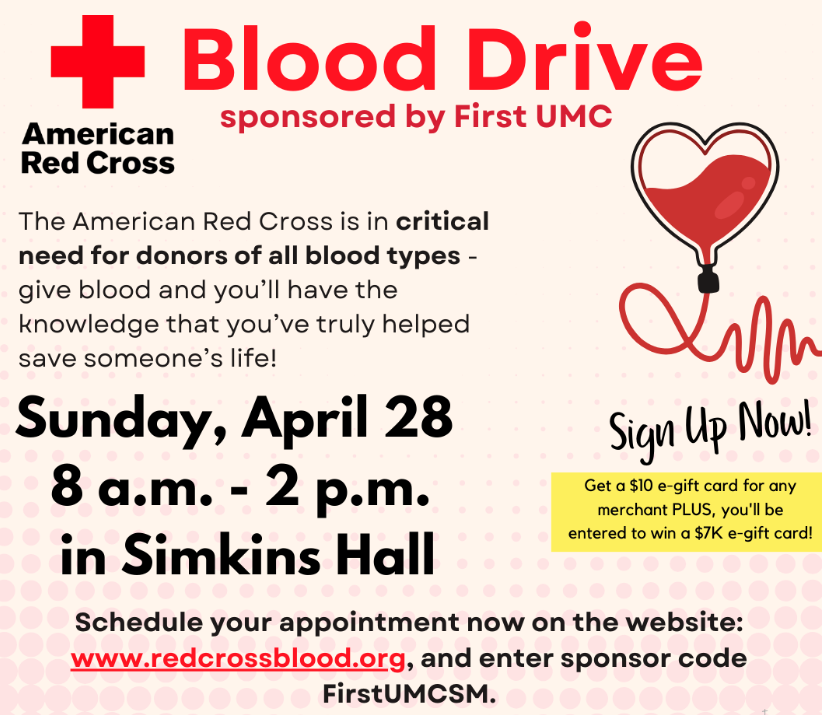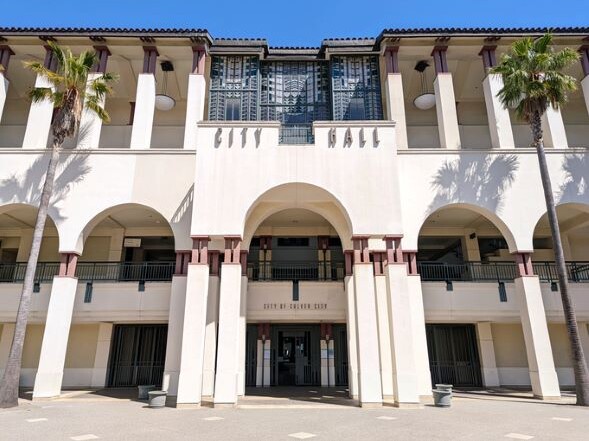As the nation is in the throes of a blood shortage, The United Methodist Church at 1008 Eleventh Street in Santa Monica (90403), will host a much-needed blood drive this Sunday, April 28, from 8:00 a.m. to 2:00 p.m. at Simkins Hall. Every donation will be much appreciated.
According to the American Red Cross, the number of U.S. blood donors has hit an all-time low compared to the last twenty years. Blood and platelet donations are needed now to help relieve the shortage and ensure lifesaving medical treatments proceed without delay.
“One of the most distressing situations for a doctor is to have a hospital full of patients and an empty refrigerator without any blood products,” Dr. Pampee, Chief Medical Officer of the Red Cross, the nation’s largest blood supplier, previously said in a statement. “A person needs lifesaving blood every two seconds in our country – and its availability can be the difference between life and death, however, blood is only available thanks to the generosity of those who roll up a sleeve to donate.”
Over the last two decades, the number of people donating blood through the Red Cross has fallen by about 40 percent. When fewer people donate blood, such as the nearly 7,000 unit shortfall in blood donations the Red Cross encountered during the period between Christmas of 2023 and New Year’s Day of 2024 alone, it can have an immense impact on the availability of blood products and drastic consequences for those in need of emergency blood transfusions.
Several factors have contributed to the decline in blood donors as how people stay involved with the communities in which they live, learn, and work has evolved over the last twenty years. Most recently the COVID-19 pandemic accelerated this drop as more people embraced remote work, posing a challenge to meeting people where they are with convenient blood drives. Before the pandemic, some eligibility changes were implemented to safeguard donors, such as raising the minimum hemoglobin thresholds, resulting in an increase in donor deferrals especially among younger donors, those 16 to 18 years old. More than a decade ago, there were also changes in protocols for blood transfusions at hospitals that impacted the need for blood. These changes highlight the convergence of several factors that have made it harder to keep and grow a motivated donor base to meet patient requirements over the past two decades.
One unit of blood, equivalent to about a pint, is collected during the average donation. Unfortunately, experts estimate that a single car accident victim can need as many as 100 units of blood.
“We hear all the time about really dramatic things that happen in hospitals – of women after childbirth who have substantial unexpected bleeding and who might require dozens or even hundreds of units of blood to survive, and then they do survive because the blood is available. Same thing for people who are in accidents or who require really complicated surgery that’s associated with a lot of blood loss,” Dr. Eric Gehrie, executive physician director for the Red Cross, said in a statement. “When that blood isn’t available, it really diminishes the ability to offer that to somebody who is in need.”
The two types of blood products that are most frequently needed are red blood cells and platelets, according to Dr. Gehrie.
“The need for platelets is constant because they only last five days after donation. As a result, it’s not really possible to build up a big inventory to draw from in the future because that inventory would just expire in a few days, and so the only thing that sustains the platelet supply are dedicated donors,” Dr. Gehrie said. “With red blood cells, the situation is a little bit different. Red blood cells can last for up to 42 days after being collected.”
“We have had a declining number of volunteer donors since Covid. The number of donors has not returned to previous levels despite Covid coming under control,” Dr. Jeanie Woo, FACC, a cardiology specialist located in Los Angeles said. “This has caused some delays in getting blood to people who really need it. Specifically, patients with rarer blood types, and patients who require frequent transfusions and then require a search for compatible blood, since they develop antibodies to many types of blood they have already been exposed to.”
In August of 2023, the Red Cross announced that more gay and bisexual men were eligible to donate blood with the use of a more inclusive risk-based individual assessment to determine whether someone is eligible to give blood, regardless of sexual orientation, sex, or gender. Historically gay and bisexual men were banned from donating.
“I think we need to reach out to donors. Many kind people are willing to donate, but with remote work now, blood drives at workplaces will yield less donations.” Dr. Woo said in response to the question of how to alleviate the blood shortage to a point the Red Cross and other prominent medical institutions are no longer alarmed. “Also, I think advertising the blood shortage will bring people out. Education that you can’t catch Covid from giving blood. Perhaps some incentives. The same way people are enticed to get their Covid shot, by receiving a ‘give away’ gift if they came in.”
A blood donor card or driver’s license or two other forms of identification are required for check in at a donation center. Individuals who are 17 years old are eligible in most states, 16 year olds with parental consent where allowed by state law, weigh at least 110 pounds, and are in typically good health may be eligible to donate blood. High school students and other donors 18 years of age and younger have to meet certain height and weight requirements.
Dr. Woo says that a good way to raise awareness about the shortage is by word of mouth. If someone has donated, they should be telling their friends. Personal recommendations go a long way.
For more information, questions, or to volunteer, contact Debi Jenkinson at [email protected]. Schedule an appointment now on the Red Cross website at www.redcrossblood.org and enter sponsor code FirstUMCSM. Get a $10 e-gift card for any merchant with donors entered to win a $7,000 e-gift card.
Promotional poster provided by the event sponsor.
Stay informed. Sign up for The Westside Voice Newsletter
By clicking submit, you agree to share your email address with Westside Voice. We do not sell or share your information with anyone.








